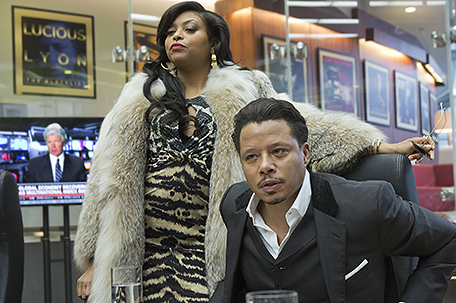
ABOVE PHOTO: Taraji P. Henson and Terrence Howard in Empire.
By Shannon M. Houston
Shadow and Act
Every once in a while, a television show comes along and actually lives up to its hype. It has a star-studded cast, a few big names in the credits, and it has everyone, everywhere buzzing about it, before anyone even bears witness to a single episode. When it premieres, audiences and critics go wild with delight. The performances, the script, and the tone are all pitch-perfect and powerful. We watch it, and we simply cannot wait to experience it again, and again in the following weeks.
This is not the way ‘Empire’ is unfolding. Although the series has broken major TV ratings records, many of us tuned in to the premiere, prepared to do some light-to-heavy eye-rolling, and, suffice it to say, got what we came for.
But some of us who continued to watch, despite a problematic first episode, and the trope-heavy plot and characters we met, have found a few compelling reasons to keep hope alive. Underneath all of the leopard print, the ridiculously long, soapy stares and line deliveries—underneath Terrence Howard playing his favorite character (Terrence Howard), and those Timbaland beats that remind all of us 30-somethings that it ain’t 1997 anymore—beneath all that lies a smart, complex drama that critiques hip-hop music and culture, as well as the black respectability politics that inform the viewing experience for some of us. Right now, in its infancy, FOX’s ‘Empire’ is a series that is far more important than good.
While many are unwilling to peel back those layers (indeed, it is a lot of leopard print, and there’s a Naomi Campbell scene d’amour that will haunt your dreams), there are elements of this show that are asking to be unpacked by thoughtful viewers. One interesting issue that wasn’t clear in the pilot, is that ‘Empire’ is a hip-hop show, that manages to embrace and elevate the music, while poking fun at and problematizing many of its inhabitants and the industry (or capitalistic empire) built around it.
When we meet Hakeem Lyon (played by Bryshere Y. Gray) he’s lazy, privileged, and too busy partying to make a decent-sounding rap song in the studio. He’s the exact kind of rapper famed voice coach Dionne Osborne described in an interview about why rappers desperately need vocal coaching: “They sound like some random dude in a basement screaming along to their own songs.” That is to say, Hakeem is the perfect reflection of many of today’s popular rap acts—so much swag, so little lyrical content. Because ‘Empire’ is somewhat flawed in its presentation of characters, it may seem like we’re supposed to take Hakeem seriously as a rising star, possible heir apparent to his father Lucious Lyon’s throne. But within a few episodes it becomes clear that Hakeem is a bit of a joke. He’s one of those 20-year-olds who refers to himself as “an original rap gangster,”—we know that we’re supposed to laugh at him. And he’s not the only rapper ‘Empire’ takes to task. Another hip-hop star compares himself to Gandhi in the same episode where his fans let shots ring out in a mall. Obviously, his name is Kid .44. Now, is it trope-ish to present these kinds of characters in a hip-hop show? Sure. But those tropes get complicated by the other characters in the series, like Taraji P. Henson’s Cookie, and Jussie Smollett’s Jamal.
One of the best critiques of Hakeem comes from his mother, Cookie, who is quick to remind him that he’s made a budding career of putting on a front—his street image is inauthentic because Hakeem comes from money. While his father Lucious may have started from the bottom, Hakeem started from the upper class, and it shows in his obnoxiously spoiled demeanor. So whether you like the series or not, I guarantee you will take great pleasure in watching Cookie lean over and whisper in her son’s ear (rather loudly, of course, in a room full of people), “You need to stop rapping like you from the streets, ‘cause you not ‘bout that life.”
This critique of the faux thug in hip-hop (of which there are many) is also a lens through which co-creator Lee Daniels explores sexuality, and how it might play into the concept of “struggle” in the black community. ‘Empire’ creates a world where a straight, privileged, young black man (Hakeem) has a very different lifestyle than a homosexual, privileged, young black man (his brother, Jamal). This is partly because Jamal’s sexuality forces him to miss out on some of that privilege. His father believes Jamal has chosen to be gay, and is, therefore, much harder on his son—so much so that Jamal eventually decides to give it all up, in an attempt to cut ties with Lucious. Hakeem will never be asked or forced to “choose” between his straight life and his father’s wealth. And because Lucious favors Hakeem, he grooms him with misogynistic thinking. (He’s the kind of Dad who tells Hakeem that his girlfriend cheating on him with another woman equate to him now being in possession of two girls—“It’s simple math!”)
As a result of the abuse he experiences, we come to see Jamal as the brother who has suffered and struggled more in life—not because of class but because of his sexual preference. Although Jamal is more R&B than hip-hop, the lines between those two genres are just as blurred on ‘Empire’ as they are in reality, so Jamal (in being an openly gay artist, willing to make sacrifices to be himself and prove himself) becomes more authentic—more hip-hop, so to speak—than his blinged-out little brother. ‘Empire’ challenges an industry where fans are often quick to embrace a rapper like Hakeem, whose talent is questionable, and who can’t even fully embrace certain elements that we attribute to hip-hop, like the struggle, or the grind (however you define those things). This same industry does not make room for homosexual artists (or fans, for that matter), because such things allegedly go against the hip-hop grain.
Now all of this is, by no means, an attempt to convert the non-believers to ‘Empire’. The reason some people of color do not like the show is simply because, well, they don’t like it—they don’t like soapy dramas, they don’t like Terrence Howard playing Terrence Howard, and they don’t like copious amounts of leopard print and furs, even when Taraji P. Henson is the one rocking them. But questions of white gaze and black respectability politics almost always arise when you’re dealing with a black cast of characters who have the tendency to behave unseemly. We might ask ourselves if ‘Empire’ troubles us, in part because we don’t want certain stereotypes promoted and embraced.
One excellent example of that awkward moment where viewers might have become hyper-sensitive to the white gaze, is Hakeem’s Barack Obama rant. He gives a drunken, bizarre, brow-furrowing (brow-furrowing because it’s actually rather interesting) monologue about Obama, who he and his cronies label “a sellout.” He begins with, “All you white people that voted for the first black President to make you feel good about not being racist, the joke’s on y’all…” As Slate writer Aisha Harris points out, the so-called black shows on television (or shows with black characters in the lead) have largely (and understandably) strayed away from any legitimate critique of our first black President, and so it’s significant that it happens here. While some of us may not want a white audience witnessing the part of the scene where Hakeem whips out his manhood in a fine dining restaurant, there’s something exciting about Hakeem taking white guilt and black respectability politics to task, even as ‘Empire’ takes rappers like him to task as well.
All of this task-taking means that, while ‘Empire’ might be flawed as a standalone series (and, to be fair, such critiques should take into account that many good shows begin with far-from-perfect inaugural seasons), it contributes to the desperately-needed diversification of television, in more ways than one. In a recent celebration of Henson’s Cookie, Shadow & Act writer Zeba Blay points out, that Cookie (who is up against the likes of Olivia Pope and Annalise Keating) “brilliantly tows the line of the so-called stereotype and the “respectable” black female lead. She’s messy, she’s complicated, she’s ‘ratchet’…” The same could be said for ‘Empire’ on the whole. For example, a black woman like me, who graduated from Sarah Lawrence, went to Camp Atwater most summers as a child, and has been accused of sounding like a white girl since the 7th grade, will always cringe a bit at the thought of [white] people watching a show like ‘Empire’, and enjoying it immensely—or at least enough to give it such high ratings. But, then again, a black woman like me, who also lived for a few years in one of the more “ratchet” parts of Cleveland (though Craven Avenue is beloved by many, myself included), also loves seeing Cookie on television, especially because—skin-tight dresses, hair weave killer, and all—she’s the smartest character on the show. ‘Empire’, in its own way, asks us to double-check that side-eye we cast upon its characters, and to investigate our own conscious or subconscious internalizations of black respectability politics.
The most exciting thing about the new series is that it is, hopefully, the beginning of better versions of itself to come—it’s the beginning of more doors (and by “doors,” I mean “money”) opening up to predominantly black casts and black TV creators. ‘Empire’ represents a major step towards incorporating hip-hop based or hip-hop inspired narratives onto network television. Rap fans who were excited about ‘Empire’, and then, perhaps, disappointed by the series, or by lyrics like the ones we heard last night from Hakeem (“she make that thing go drip drop/drip drippitty drop”) might still root for the show’s success. The better ‘Empire’ performs, the more likely we are to eventually see a series with a different (i.e. less pop), type of hip-hop tale at the center. And the more Cookie succeeds as a crowd favorite, the more likely we are to see more complicated black women, and bizarre black women, and awkward black women (cheers to Issa Rae) on television. And that, indeed, is something to get excited about.
Shannon M. Houston is Assistant TV Editor & film critic at Paste Magazine, and a writer for Pink is the New Blog and Heart&Soul Magazine. This New York-based freelancer probably has more babies than you, but that’s okay; you can still be friends. She welcomes all follows (and un-follows) on Twitter.
















Leave a Comment